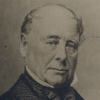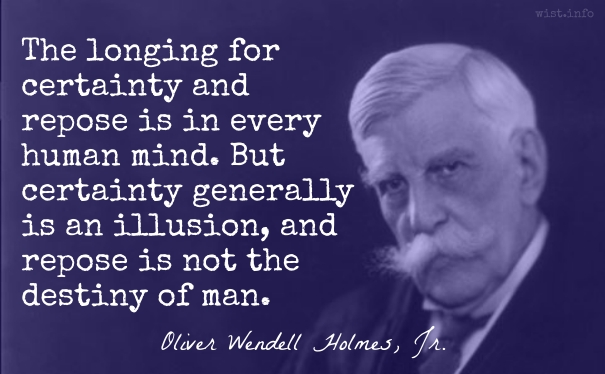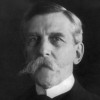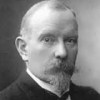Everyone has a confused notion of good,
On which he sets his mind, and which he desires;
And therefore everyone tries to attain it.[Ciascun confusamente un bene apprende
nel qual si queti l’animo, e disira;
per che di giugner lui ciascun contende.]Dante Alighieri (1265-1321) Italian poet
The Divine Comedy [Divina Commedia], Book 2 “Purgatorio,” Canto 17, l. 127ff (17.127-129) [Virgil] (1314) [tr. Sisson (1981)]
(Source)
(Source (Italian)). Alternate translations:
All follow good; but with uncertain aim.
At once it kindles, and it soothes their flame.
[tr. Boyd (1802), st. 32]
All indistinctly apprehend a bliss
On which the soul may rest, the hearts of all
Yearn after it, and to that wished bourn
All therefore strive to tend.
[tr. Cary (1814)]
A good each one confusedly apprehends
The mind to quiet -- satisfy desire;
Hence to attain 't will every one conspire.
[tr. Bannerman (1850)]
Each one confusedly a good conceives
Wherein the mind may rest, and longeth for it;
Therefore to overtake it each one strives.
[tr. Longfellow (1867)]
Each one confusedly apprehends a good wherein his mind may rest, and desires it ; wherefore each one strives to reach Him.
[tr. Butler (1885)]
Some good doth each confusedly apprehend.
In which to rest his spirit's longing fain,
Therefore to reach to it doth each contend.
[tr. Minchin (1885)]
Every one confusedly apprehends a good in which the mind may be at rest, and which it desires; wherefore every one strives to attain it.
[tr. Norton (1892)]
Each one apprehends vaguely a good wherein the mind may find rest, and desires it; wherefore each one strives to attain thereto.
[tr. Okey (1901)]
Everyone confusedly apprehends a good in which the mind may be at rest and desires it, so that each strives to reach it.
[tr. Sinclair (1939)]
Each one confusedly doth apprehend
A longed-for good, wherein the mind may find rest;
And therefore each one strives to attain that end.
[tr. Binyon (1943)]
Everyone vaguely pictures in his mind
A good the heart may rest on, and is driven
By his desire to seek it and to find.
[tr. Sayers (1955)]
All men, though in a vague way, apprehend
a good their souls may rest in, and desire it;
each, therefore, strives to reach his chosen end.
[tr. Ciardi (1961)]
Each one apprehends vaguely a good wherein the mind may find rest, and this it desires' wherefore each one strives to attain thereto.
[tr. Singleton (1973)]
All of you, vaguely, apprehend and crave
a good with which your heart may be at rest;
and so, each of you strives to reach that goal.
[tr. Musa (1981)]
Each apprehends confusedly a Good
in which the mind may rest, and longs for It;
and, thus, all strive to reach that Good.
[tr. Mandelbaum (1982)]
Each confusedly apprehends a Good in which his spirit may be quieted, and desires it, and therefore each strives to reach it.
[tr. Durling (2003)]
Everyone vaguely apprehends a good, where the mind finds rest: and desires it: so everyone labours to attain it.
[tr. Kline (2002)]
We all, confusedly, conceive a good,
desiring that our hearts may rest in that.
And each will strive to make their way to it.
[tr. Kirkpatrick (2007)]
Everyone can vaguely apprehend some good
in which the mind may find its peace.
With desire, each one strives to reach it.
[tr. Hollander/Hollander (2007)]
They muddle about, knowing there is goodness
In which their minds can rest, and they wish to have it,
All of them struggling to find what's so desired.
[tr. Raffel (2010)]
Quotations about:
rest
Note not all quotations have been tagged, so Search may find additional quotes on this topic.
In short, I consider this world as a place which nature never designed for my permanent abode, and I look upon my departure out of it, not as being driven away from my habitation, but as leaving my inn.
[Et ex vita ita discedo tamquam ex hospitio, non tamquam e domo; commorandi enim natura devorsorium nobis, non habitandi dedit.]
Marcus Tullius Cicero (106-43 BC) Roman orator, statesman, philosopher
De Senectute [Cato Maior; On Old Age], ch. 23 / sec. 84 (23.84) (44 BC) [tr. Melmoth (1773)]
(Source)
(Source (Latin)). Alternate translations:
I departe me from this presente life as a walkyng weyfaryng man or as a voyagieng pilgryme departith from some lodgyng place or an hostellrye for to come to his owne dwellyng house. But I departe me not from this life as the lorde departeth from his owne house for this passable life is nowght ellys but as a lodgyng place or an hostellrye.
[tr. Worcester/Worcester/Scrope (1481)]
And I depart out of this life as out of an inn, and not out of a dwellinghouse. For nature hath given to us a lodging to remain and sojourn in for a time, and not to dwell in continually.
[tr. Newton (1569)]
And I depart out of this life, as from an Inne, not as from a continuall habitation; for nature hath given us a place to rest in, not to dwell in.
[tr. Austin (1648)]
Hence from an Inne, not from my home, I pass,
Since Nature meant us here no dwelling place.
[tr. Denham (1669)]
I have not frustrated the End of Nature, and am disposed to leave this life, with as much Indifference, as an Inn upon the Road; for Nature here intends us a Lodging only, not a Fixed Home or Settled Place of Habitation.
[tr. Hemming (1716)]
And now I go from this Life as from an Inn; for Nature hath given it us as a Place to rest in, but not for a continual Habitation.
[tr. J. D. (1744)]
And when the Close comes, I shall quit Life as I would an Inn, and not as a real Home. For Nature appears to me to have ordain'd this Station here for us, as a Place of Sojournment, a transitory Abode only, and not as a fixt Settlement or permanent Habitation.
[tr. Logan (1744)]
I depart out of life just as out of an inn, and not as out of my home. For Nature has given us an hotel to sojourn in, not a place to dwell in.
[Cornish Bros. ed. (1847)]
And from this life I depart as from a temporary lodging, not as from a home. For nature has assigned it to us as an inn to sojourn in, not a place of habitation.
[tr. Edmonds (1874)]
Yet I depart from life, as from an inn, not as from a home; for nature has given us here a lodging for a sojourn, not a place of habitation.
[tr. Peabody (1884)]
But I quit life as I would an inn, not as I would a home. For nature has given us a place of entertainment, not of residence.
[tr. Shuckburgh (1895)]
I now depart
As from a lodging; house, and not a home.
Nature has made this world a place in which
One stays a little, does not dwell for aye.
[tr. Allison (1916)]
And I quit life as if it were an inn, not a home. For Nature has given us an hostelry in which to sojourn, not to abide.
[tr. Falconer (1923)]
But what nature gives us is a place to dwell in temporarily, not one to make our own. When I leave life, therefore, I shall feel as if I am leaving a hostel rather than a home.
[tr. Grant (1960, 1971 ed.)]
And I am departing from life as from a temporary lodging, not as from a home. Yes, nature has given a spot where we may turn aside for a time, not a place of permanent residence.
[tr. Copley (1967)]
But I do feel as though I am leaving an inn, not my home. Nature has given us a place to stay for a while, but not for ever.
[tr. Cobbold (2012)]
I leave this life as I would leave
An inn and not a home. Nature
Gave us in fact a temporary hotel,
Not a permanent place in which to dwell.
[tr. Bozzi (2015)]
I depart from life as if from an inn, not a house. Nature gives us our bodies to abide in only for a time as guests, not to make our home.
[tr. Freeman (2016)]
And I am leaving life as if from an inn, not a home. For nature has given us a way-station for a brief delay, not to permanently reside.
[tr. @sentantiq (2018)]
If you look for rest in this life, how will you attain to everlasting rest? Dispose yourself, then, not for much rest but for great patience.
[Si quæris in hac vita requiem: quomodo tunc pervenies ad æternam requiem? Non ponas te ad multam requiem, sed a magnam patientiam.]Thomas à Kempis (c. 1380-1471) German-Dutch priest, author
The Imitation of Christ [De Imitatione Christi], Book 3, ch. 35, v. 3 (3.35.2) (c. 1418-27) [tr. Croft/Bolton (1940)]
(Source)
(Source (Latin)). Alternate translations:
If thou seek rest in this life, how then shalt thou come to the rest everlasting? Set not thyself to have rest here, but to have patience.
[tr. Whitford/Raynal (1530/1871)]
If you seek rest in this life, how will you, then, come to everlasting rest? Do not determine to have rest here, but to have patience.
[tr. Whitford/Gardiner (1530/1955)]
If thou seekest rest in this world, how wilt thou then attain to everlasting rest? Give not thy selfe to much ease, but to much patience.
[tr. Page (1639), 3.35.6]
If then these are the Conditions of thy Obedience and Reward, think how absurd it, for them who indulge their Ease here, to expect Peace and Happiness hereafter. In one of the two States Enduring must be thy Lot; and therefore tough Patience, and not soft Repose, is what thou should'st labour for at present.
[tr. Stanhope (1696; 1706 ed.), 3.40]
If thou seekest rest in this life, how wilt thou attain to the everlasting rest of the life to come? Thou must prepare thy heart for the exercise of many and great troubles, not for the enjoyment of continual rest.
[tr. Payne (1803), 3.27.8]
If thou seek rest in this life, how wilt thou then attain to the everlasting Rest? Dispose not thyself for much rest, but for great patience.
[ed. Parker (1841)]
It thou seekest rest in this life, how wilt thou attain to the everlasting rest of the life to come? Thou must not merely rest, but prepare thy heart for far greater patience and resignation.
[tr. Dibdin (1851), 3.31.2]
If thou seekest rest in this life, how then wilt thou come to the rest everlasting? Dispose not thyself for much rest, but for much patience.
[ed. Bagster (1860)]
If thou seek rest in this life, how then wilt thou attain unto the rest which is eternal? Set not thyself to attain much rest, but much patience.
[tr. Benham (1874)]
If thou seek rest in this life, how wilt thou then attain to the everlasting rest? Dispose not thyself for much rest, but for great patience.
[tr. Anon. (1901)]
If you search after rest in this life, how then will you come through to an everlasting rest? Do not set out for much in the way of rest, but for suffering that costs.
[tr. Daplyn (1952)]
If you look for rest in this life, how can you attain eternal rest? Dispose yourself not to rest, but to patient endurance.
[tr. Sherley-Price (1952)]
If you try to find rest in this world, how will you ever reach that rest which is life everlasting? It is not long hours of rest you must be prepared for here, but for long hours of patient endurance.
[tr. Knox-Oakley (1959)]
If you are looking for rest in this life, how will you ever reach the everlasting rest at the end? It is not rest you must expect, but suffering.
[tr. Knott (1962)]
You may seek rest in this life. How then will you gain rest in everlasting life? Do not expect great rest. Expect much suffering instead.
[tr. Rooney (1979)]
If you seek rest in this life, how do you expect to come to eternal rest? Do not make frequent rest your goal but great patience.
[tr. Creasy (1989)]
“Here is where you can’t afford to be lazy,”
My Master said. “Lying in feather beds,
Or under quilts, no one conquers fame,
Without which, once your earthly life is dead,
The only traces you leave behind you are smoke
Blown in the air or bubbles breaking in water.[“Omai convien che tu così ti spoltre”,
disse ’l maestro; “ché, seggendo in piuma,
in fama non si vien, né sotto coltre;
sanza la qual chi sua vita consuma,
cotal vestigio in terra di sé lascia,
qual fummo in aere e in acqua la schiuma.”]Dante Alighieri (1265-1321) Italian poet
The Divine Comedy [Divina Commedia], Book 1 “Inferno,” Canto 24, l. 46ff (24.46-51) [Virgil] (1309) [tr. Raffel (2010)]
(Source)
The analogy of life to smoke and foam have been noted by commentators as resembling similar metaphors in Wisdom 2:1-4 and 5:14 and the Aeneid 5.740.
Virgil's urging of Dante to continue on out of a desire for fame, rather than to learn how to be saved or to come closer to God, have only recently been interpreted as an intentional showing that the poet/guide is not perfect -- another reason, beyond being only a virtuous pagan, that he cannot complete the journey with Dante to Paradise. (See here for more commentary on this.)
(Source (Italian)). Alternate translations:
It now is proper, said my Lord, that you
Should from this bed of yours arise; for they
Ne'er Fame acquire who spend their lives in down:
He who, without pursuing her, consumes
His time, leaves himself such tracts behind,
As Froth in Water, or as Smoke in Air.
[tr. Rogers (1782), ll. 44-49]
Arise! -- In vain the slumb'ring soul aspires,
(Her powers betray'd by sloth, extinct her fires)
In vain she tries the dazzling heights of fame:
As morning fogs disperse to meet no more,
As the waves close behind the lab'ring oar,
The dastard soul expires without a name!
[tr. Boyd (1802), st. 9]
“Now needs thy best of man;” so spake my guide:
“For not on downy plumes, nor under shade
Of canopy reposing, fame is won,
Without which whosoe’er consumes his days
Leaveth such vestige of himself on earth,
As smoke in air or foam upon the wave."
[tr. Cary (1814)]
"Rouse thee," my master urged, "'tis time to throw
This lethargy aside; who dozing lies
'Tween coverlet and feathers, ne'er shall know
Renown, and without her who wastes and dies,
Leaves of himself like trace on earth behind,
As foam on wave, or vapour on the skies."
[tr. Dayman (1843)]
"Now it behooves thee thus to free thyself from sloth," said the Master: "for sitting on down, or under coverlet, man come not into fame;
without which whoso consumes his his life, leaves such vestige of himself on earth, as smoke in air or foam in water."
[tr. Carlyle (1849)]
"Henceforth you must abandon indolence,"
My master said: "'tis not repose on plumes
That leads to fame -- nor yet in shady glooms;
Without the which if one consumes his life,
E'en such a vestige upon the earth he'll make
As smoke in air, or foam on water's track."
[tr. Bannerman (1850)]
"Now it befits thee to shake off this sloth,"
The Master said, "for resting upon down,
And under quilts is not the way to fame;
And without this he who his life consumes,
Leaves of himself on earth no better trace,
Than smoke in air or on the water foam."
[tr. Johnston (1867)]
"Now it behoves thee thus to put off sloth,"
My Master said; "for sitting upon down,
Or under quilt, one cometh not to fame,
Without which whoso his life consumes
Such vestige leaveth of himself on earth,
As smoke in air or in the water foam."
[tr. Longfellow (1867)]
"Henceforward it behoves that thou brace thyself thus," said the Master; "for not by sitting on feathers does one come into fame, nor under quilts; without the which whoso consumes his life leaves such trace on earth of himself as smoke in air or its froth on water."
[tr. Butler (1885)]
"Henceforth 'tis fitting thou shouldst shake off sloth,"
The master cried, "since idly lapt in down
'Neath coverlets, for him Fame never groweth.
Who so his life consumes without renown.
Leaves such a vestige of himself on earth,
As it were froth on air or water blown."
[tr. Minchin (1885)]
“Now it behoves thee thus to put off sloth,” said the Master, “for, sitting upon down or under quilt, one attains not fame, without which he who consumes his life leaves of himself such trace on earth as smoke in air, or in water the foam."
[tr. Norton (1892)]
"'Tis thus that thou must now shake thyself free from sloth," my Master said, "for seated on down, or under coverlet, man cometh not to fame; unattended by which whoso doth spend his days, leaveth such traces of himself on earth, as smoke in air or foam on water."
[tr. Sullivan (1893)]
"Thus must thou ever shake off sloth henceforward;"
The Master said, " for sitting upon feathers
Man cometh not to fame, nor under quilting;
Which lacking, whosoe'er consumes his life-time
Leaves of himself on earth just such a vestige
As smoke doth leave in air, and foam in water."
[tr. Griffith (1908)]
"Now must thou thus cast off all sloth," said the Master "for sitting on down or under blankets none comes to fame, and without it he that consumes his life leaves such trace of himself on earth as smoke in air or foam on water."
[tr. Sinclair (1939)]
"Now it behoveth lassitude to leave,"
The Master said, "for softly on down reclined
Or under coverlet, none can fame achieve,
Without which he who dallieth leaves behind
Such vestige of himself on earth imprest
As foam in water or smoke upon the wind."
[tr. Binyon (1943)]
"Put off this sloth," the master said, "for shame!
Sitting on feather-pillows, lying reclined
Beneath the blanket is no way to fame --
Fame, without which man's life wastes out of mind,
Leaving on earth no more memorial
Than foam in water or smoke upon the wind."
[tr. Sayers (1949)]
"Up on your feet! This is no time to tire!"
my Master cried. "The man who lies asleep
will never waken fame, and his desire
and all his life drift past him like a dream,
and the traces of his memory fade from time
like smoke in the air, or ripples on a stream."
[tr. Ciardi (1954)]
“Now it behooves you thus to cast off sloth,” said my master, “for sitting on down or under coverlet, no one comes to fame, without which whoso consumes his life leaves such vestige of himself on earth as smoke in air or foam on water."
[tr. Singleton (1970)]
"Come on, shake off the covers of this sloth,"
the master said, "for sitting softly cushioned,
or tucked in bed, is no way to win fame;
and without it man must waste his life away,
leaving such traces of what he was on earth
as smoke in wind and foam upon the water."
[tr. Musa (1971)]
“Now you must cast aside your laziness,”
my master said, “for he who rests on down
or under covers cannot come to fame;
and he who spends his life without renown
leaves such a vestige of himself on earth
as smoke bequeaths to air or foam to water."
[tr. Mandelbaum (1980)]
"Now is the time for you to rouse yourself,"
The master said; "for sitting on a cushion
Is not the way to fame, nor staying in bed;
And without fame, a man must spend his life
Only to leave such traces upon earth
As smoke leaves in the air, or foam in the water."
[tr. Sisson (1981)]
"To cast off sloth
Now well behooves you," said my master then:
"For resting on soft down, or underneath
The blanket's cloth, is not how fame is won --
Without which, one spends life to leave behind
As vestige of himself on earth the sign
Smoke leaves on air, or foam on water."
[tr. Pinsky (1994), l. 46ff]
“From now on you will have to cast off sloth in this way,” said my master, “for one does not gain fame sitting on down cushions, or while under coverlets;
and whoever consumes his life without fame leaves a mark of himself on earth like smoke in the air or foam in water."
[tr. Durling (1996)]
Now, you must free yourself from sloth: men do not achieve fame, sitting on down, or under coverlets; fame, without which whoever consumes his life leaves only such trace of himself, on earth, as smoke does in the air, or foam on water.
[tr. Kline (2002)]
"Now you must needs," my teacher said, "shake off
your wonted indolence. No fame is won
beneath the quilt or sunk in feather cushions.
Whoever, fameless, wastes his life away,
leaves of himself no greater mark on earth
than smoke in air or froth upon the wave."
[tr. Kirkpatrick (2006)]
'Now must you cast off sloth,' my master said.
'Sitting on feather cushions or stretched out
under comforters, no one comes to fame.
Without fame, he who spends his time on earth
leaves only such a mark upon the world
as smoke does on the air or foam on water.'
[tr. Hollander/Hollander (2007)]
“Now you must,”
My Guide said, “quell the slothful urge to rest.
A swansdown seat and a soft blanket just
Keep you from fame, without which no one who
Consumes his life leaves more trace in the world
Than smoke in air and foam on water do."
[tr. James (2013)]
It was the time when sleep first comes to weary mortals,
creeping over us, the sweetest gift of gods.[Tempus erat quo prima quies mortalibus aegris
incipit et dono divum gratissima serpit.]Virgil (70-19 BC) Roman poet [b. Publius Vergilius Maro; also Vergil]
The Aeneid [Ænē̆is], Book 2, l. 268ff (2.268-269) (29-19 BC) [tr. Bartsch (2021)]
(Source)
(Source (Latin)). Alternate translations:
It was the time, first sleep the weary soule
Possest, and heavens best gift on mortalls stole.
[tr. Ogilby (1649)]'T was in the dead of night, when sleep repairs
Our bodies worn with toils, our minds with cares.
[tr. Dryden (1697)]
It was the time when the first sleep invades languid mortals, and steals upon them, by the gift of the gods, most sweet.
[tr. Davidson/Buckley (1854)]
It was the hour when Heaven gives rest
To weary man, the first and best.
[tr. Conington (1866)]
It was the hour when first their sleep begins
For wretched mortals, and most gratefully
Creeps over them, by bounty of the gods.
[tr. Cranch (1872), l. 271ff]
It was the time when by the gift of God rest comes stealing first and sweetest on unhappy men.
[tr. Mackail (1885)]
It was the time when that first peace of sick men hath begun,
By very gift of God o'er all in sweetest wise to creep.
[tr. Morris (1900)]
'Twas now the time, when on tired mortals crept
First slumber, sweetest that celestials pour.
[tr. Taylor (1907), st. 36, l. 316ff]
That hour it was when heaven's first gift of sleep
on weary hearts of men most sweetly steals.
[tr. Williams (1910)]
It was the hour when for weary mortals their first rest begins, and by grace of the gods steals over them most sweet.
[tr. Fairclough (1916)]
It was the time when the first sleep begins
For weary mortals, heaven’s most welcome gift.
[tr. Humphries (1951)]
It was the hour when worn-out men begin to get
Some rest, and by god's grace genial sleep steals over them.
[tr. Day Lewis (1952)]
It was the hour when for troubled mortals
rest -- sweetest gift of gods that glides to men --
has just begun.
[tr. Mandelbaum (1971), l. 371ff]
That time of night it was when the first sleep,
Gift of the gods, begins for ill mankind,
Arriving gradually, delicious rest.
[tr. Fitzgerald (1981), l. 360ff]
It was the time when rest, the most grateful gift of the gods, was first beginning to creep over suffering mortals.
[tr. West (1990)]
It was the hour when first sleep begins for weary mortals,
and steals over them as the sweetest gift of the gods.
[tr. Kline (2002)]
At that late hour, when sleep begins to drift
Upon fretful humanity as grace from the gods ....
[tr. Lombardo (2005), l. 319ff]
This was the hour when rest, that gift of the gods
most heaven-sent, first comes to beleaguered mortals,
creeping over us now.
[tr. Fagles (2006), l. 339ff]
Happiness is thought to imply leisure; for we toil in order that we may have leisure, as we make war in order that we may enjoy peace.
[δοκεῖ τε ἡ εὐδαιμονία ἐν τῇ σχολῇ εἶναι, ἀσχολούμεθα γὰρ ἵνα σχολάζωμεν καὶ πολεμοῦμεν ἵν᾽ εἰρήνην ἄγωμεν.]
Aristotle (384-322 BC) Greek philosopher
Nicomachean Ethics [Ἠθικὰ Νικομάχεια], Book 10, ch. 7 (10.7) / 1177b.4 (c. 325 BC) [tr. Peters (1893), 10.7.6]
(Source)
(Source (Greek)). Alternate translations:
Happiness is thought to stand in perfect rest; for we toil that we may rest, and war that we may be at peace.
[tr. Chase (1847), ch. 6]
It would seem that happiness is the very antithesis of a busy life, in that it is compatible with perfect leisures. And it is with such leisure in view that a busy life is always led, exactly as war is only waged for the sake of ultimate peace.
[tr. Williams (1869)]
The end of labor is to gain leisure.
[in Ballou, Treasury of Thought (1872)]
Happiness is thought to depend on leisure; for we are busy that we may have leisure, and make war that we may live in peace.
[tr. Ross (1908)]
Happiness is thought to involve leisure; for we do business in order that we may have leisure, and carry on war in order that we may have peace.
[tr. Rackham (1934)]
Happiness seems to reside in leisure, since we do unleisured things in order to be at leisure, and wage war in order to live in peace.
[tr. Reeve (1948)]
Happiness is thought to depend on leisure; for we toil for the sake of leisurely activity, and we are at war for the sake of peaceful activity.
[tr. Apostle (1975)]
Happiness seems to depend on leisure, because we work to have leisure, and wage war to live in peace.
[tr. Crisp (2000)]
[Because], happiness seems to reside in leisure, we labor [sacrifice leisure] so that we may have leisure.
[tr. @sentantiq (2018)]
Thou morning client, this is my retreat:
Go to the town and palace of the great.
No lawyer I, nor can your cause defend;
But old, and idle, and the muse’s friend.
Ease and repose I love, but if in vain
I seek them here; why not to town again?[Matutine cliens, urbis mihi causa relictae,
Atria, si sapias, ambitiosa colas.
Non sum ego causidicus, nec amaris litibus aptus,
Sed piger et senior Pieridumque comes;
tia me somnusque iuvant, quae magna negavit
Roma mihi: redeo, si vigilatur et hic.]Martial (AD c.39-c.103) Spanish Roman poet, satirist, epigrammatist [Marcus Valerius Martialis]
Epigrams [Epigrammata], Book 12, epigram 68 (12.68) (AD 101) [tr. Hay (1755)]
(Source)
(Source (Latin)). Alternate translations:
Whoe'er in town dist morning-homage pay,
And wast one cause, why thence I win'd my way;
Hunt now ambition's hants, let me advise;
And learn, at least in this, learn to be wise.
I am no brangler, nor can hairs untwine:
My growing age asks ease, yet woos the Nine.
Scenes are my joy, for which at Rome I sigh'd:
But thither I return, if here deni'd.
[tr. Elphinston (1782), Book 2, ep. 136]
O clients, that beset me in the morning, and who were the cause of my departure from Rome, frequent, if you are wise, the lordly mansions of the city. I am no lawyer, nor fitted for pleading troublesome causes, but inactive, somewhat advanced in years, and a votary of the Pierian sisters. I wish to enjoy repose and slumber, which great Rome denied; but I must return thither, if I am to be equally hunted here.
[tr. Bohn's Classical (1859)]
Morning client, the cause of my leaving Rome, you would court, were you wise, the halls of greatness. No pleader am I, nor fitted for bitter lawsuits, but an indolent man and one growing old, and the comrade of the Muses. Ease and sleep attract me, and great Rome denied me these; I return if I am sleepless even here.
[tr. Ker (1919)]
I fled from Rome and early calls,
So, Spanish friends, I pray you,
Be wise and seek the lordly halls
Of those who can repay you.
I hate the courts, and legal strife
My lazy mind refuses,
For I am getting on in life
And love to serve the Muses;
Unbroken sleep I love; the stir
And din of Rome destroy it;
But I am going back to her
If here I can't enjoy it.
[tr. Pott & Wright (1921)]
Poor morning client (you remind me
Of all I loathed and left behind me
in Rome), if you had any nous
Instead of calling on my house
You'd haunt the mansions of the great.
I'm not some wealthy advocate
Blessed with a sharp, litigious tongue,
I'm just a lazy, far from young
Friend of the Muses who likes ease
And sleep. Great Rome denied me these:
If I can't find them even in Spain,
I may as well go back again.
[tr. Michie (1972)]
Morning client, reason why I left Rome, if you were sensible, you wuiold dance attendance on pretentious halls. I am no advocate nor apt for bitter lawsuits, but lazy and elderly and a companion of the Pierian maids. I am fond of leisure and sleep, which great Rome denied me. If I'm kept awake here too, I go back.
[tr. Shackleton Bailey (1993)]
You want a patron, and you pester me --
Exactly what made me the City flee.
You're not at some ambitious lawyer's door.
A poet now retired, I'd rather snore.
If Rome you are inflicting on me here,
Then backward to the real one I must steer.
[tr. Wills (2007)]
You early-morning client -- you're the reason I left Rome. If you had sense, you'd hang around the lobbies of people who care about appearances. I'm no barrister, I've no head for bitter litigation: I'm sleepy, I'm getting old, I hang out with the Muses; what I like is free time and sleep, the very things that mighty Rome wouldn't let me have. If there are early mornings even here, I'm going back.
[tr. Nisbet (2015)]
Morning appointment -- my reason for leaving the city --
If you knew better, you would visit more ambitious homes.
I am no lawyer, no man prepared for harsh suits,
I am a lazy and aging friend of the Muses.
Sleep and leisure make me happy -- the very things
Which Rome denied me. But I’ll go back if I can’t sleep here.
[tr. @sentantiq (2018)]
Where music thundered let the mind be still,
Where the will triumphed let there be no will,
What light revealed, now let the dark fulfill.May Sarton (1912-1995) Belgian-American poet, novelist, memoirist [pen name of Eleanore Marie Sarton]
“Now Voyager”
(Source)
First published in The Lion and the Rose, Part 3 (1948).
It was the fixation of businessmen that the W.P.A. did nothing but lean on shovels. I had an uncle who was particularly irritated at shovel-leaning. When he pooh-poohed my contention that shovel leaning was necessary, I bet him five dollars, which I didn’t have, that he couldn’t shovel sand for fifteen timed minutes without stopping. He said a man should give a good day’s work and grabbed a shovel. At the end of three minutes his face was red, at six he was staggering and before eight minutes were up his wife stopped him to save him from apoplexy. And he never mentioned shovel-leaning again. I’ve always been amused at the contention that brain work is harder than manual labor. I never knew a man to leave a desk for a muck-stick if he could avoid it.
Is not short paine well borne, that brings long ease,
And layes the soule to sleepe in quiet grave?
Sleepe after toyle, port after stormie seas,
Ease after warre, death after life, does greatly please.Edmund Spenser (c. 1552-1599) English poet
The Faerie Queene, Book 1, Canto 9, st. 40 (1589-96)
(Source)
BOB: No matter how many times you save the world, it always manages to get back in jeopardy again. Sometimes I just want it to stay saved! You know?! For a little bit. I feel like the maid: “I just cleaned up this mess! Can we keep it clean for, for 10 minutes?! Please?!”
The deep, deep peace of the double bed after the hurly-burly of the chaise-longue.
Beatrice Campbell (1865-1940) English actress [Mrs. Patrick Campbell, née Beatrice Stella Tanner]
(Attributed)
(Source)
Describing her recent marriage. Quoted in Alexander Woollcott, "The First Mrs. Tanqueray," While Rome Burns (1934)
When action grows unprofitable, gather information; when information grows unprofitable, sleep.
God offers to every mind its choice between truth and repose. Take which you please — you can never have both.
Ralph Waldo Emerson (1803-1882) American essayist, lecturer, poet
“Intellect,” Essays: First Series (1841)
(Source)
Though sleep is called our best friend, it is a friend who often keeps us waiting!
Jules Verne (1828-1905) French novelist, poet, playwright
The Steam House, Book 2, ch. 5 (1880)
(Source)
I begin to think that a calm is not desirable in any situation in life. Every object is beautiful in motion; a ship under sail, trees gently agitated with the wind, and a fine woman dancing, are three instances in point. Man was made for action and for bustle too, I believe.
There is a fire-fly in the southern clime
Which shineth only when upon the wing;
So it is with the mind: when once we rest,
We darken.Philip James Bailey (1816-1902) English poet, lawyer
Festus, Sc. “A Village Feast – Evening” [Festus] (1839)
(Source)
Usually paraphrased (earliest source (1872)):
The firefly only shines when on the wing.
So is it with the mind -- when once we rest
We darken.
You may batter your way through the thick of the fray,
You may sweat, you may swear, you may grunt;
You may be a jack-fool, if you must, but this rule
Should ever be kept at the front:–
Don’t fight with your pillow, but lay down your head
And kick every worriment out of the bed.
Some find activity only in repose, and others repose only in movement.
[Les uns ne peuvent trouver d’activité que dans le repos, el les autres de repos que dans le mouvement.]
Joseph Joubert (1754-1824) French moralist, philosopher, essayist, poet
Pensées [Thoughts], ch. 4 “De la Nature des Esprits [On the Nature of Minds]” ¶ 19 (1850 ed.) [tr. Calvert (1866)]
(Source)
(Source (French)). Alternate translation:
There are some who can only find activity in repose, and others who can only find repose in movement.
[tr. Lyttelton (1899), ch. 2, ¶ 11]
There is no real going back. Though I may come to the Shire, it will not seem the same; for I shall not be the same. I am wounded with knife, sting, and tooth, and a long burden. Where shall I find rest?
J.R.R. Tolkien (1892-1973) English writer, fabulist, philologist, academic [John Ronald Reuel Tolkien]
The Lord of the Rings, Vol. 3: The Return of the King, Book 6, ch. 7 “Homeward Bound” [Frodo] (1955)
(Source)
HENRY: Canst thou, O partial sleep, give thy repose
To the wet sea-boy in an hour so rude,
And, in the calmest and most stillest night,
With all appliances and means to boot,
Deny it to a king? Then, happy low, lie down.
Uneasy lies the head that wears a crown.William Shakespeare (1564-1616) English dramatist and poet
Henry IV, Part 2, Act 3, sc. 1, l. 26ff (3.1.26-31) (c. 1598)
(Source)
The best doctors in the world are Doctor Diet, Doctor Quiet, and Doctor Merryman.
Let the sweet Muses lead me to their soft retreats, their living fountains, and melodious groves, where I may dwell remote from care, master of myself … let me no more be seen in the wrangling forum, a pale and odious candidate for precarious fame … let me live free from solicitude … and when nature shall give the signal to retire may I possess no more than I may bequeath to whom I will. At my funeral let no token of sorrow be seen, no pompous mockery of woe. Crown me with chaplets; strew flowers on my grave, and let my friends erect no vain memorial to tell where my remains are lodged.
Tacitus (c.56-c.120) Roman historian, orator, politician [Publius or Gaius Cornelius Tacitus]
“A Dialogue on Oratory,” sec. 13, Dialogus, Agricola, Germania
In The Works of Tacitus, Oxford trans., rev., vol. 2, (1854). The above is the version read at the funeral for Justice Hugo Black. The printed version differs in reading, at the start, "Me let the sweet Muses lead," and in using "anxious" for "odious."
Alt trans. (Peterson (1914)): "As for myself, may the 'sweet Muses,' as Virgil says, bear me away to their holy places where sacred streams do flow, beyond the reach of anxiety and care, and free from the obligation of performing each day some task that goes against the grain. May I no longer have anything to do with the mad racket and the hazards of the forum, or tremble as I try a fall with white-faced Fame. I do not want to be roused from sleep by the clatter of morning callers or by some breathless messenger from the palace; I do not care, in drawing my will, to give a money-pledge for its safe execution through anxiety as to what is to happen afterwards; I wish for no larger estate than I can leave to the heir of my own free choice. Some day or other the last hour will strike also for me, and my prayer is that my effigy may be set up beside my grave, not grim and scowling, but all smiles and garlands, and that no one shall seek to honour my memory either by a motion in the senate or by a petition to the Emperor."
Sleep, ignorant of pain, sleep, ignorant of grief, may you come to us blowing softly, kindly, kindly come, king.
Sophocles (496-406 BC) Greek tragic playwright
Philoctetes, l. 827.
(Source)
Alt. trans.: "Come, blowing softly, Sleep, that know'st not pain, / Sleep, ignorant of grief, / Come softly, surely, kingly sleep, and bless ...." [E. H. Plumptre (1871)]
… [L]onging for certainty and for repose [is] in every human mind. But certainty generally is an illusion, and repose is not the destiny of man.
Oliver Wendell Holmes, Jr. (1841-1935) American jurist, Supreme Court Justice
“The Path of the Law,” Harvard Law Review (Feb 1897)
(Source)
Citation 10 Harvard Law Review 457 (1897).






























